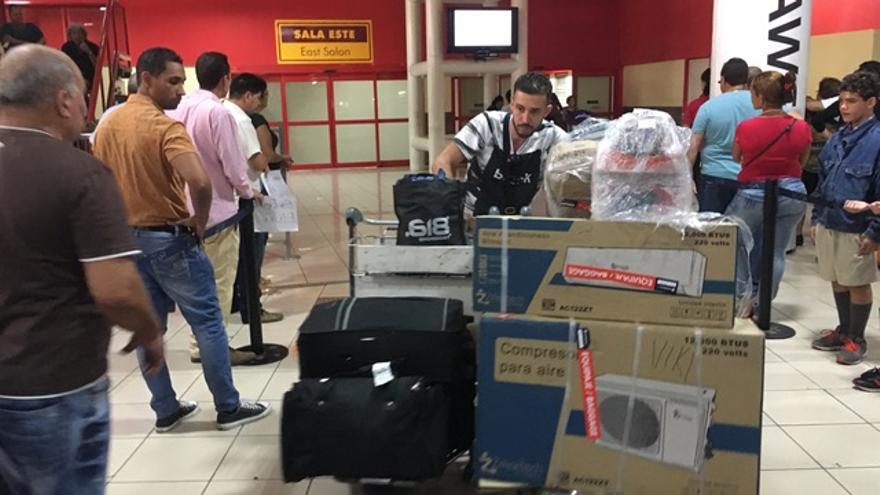
![]() 14ymedio, Havana, 18 January 2018 — Ordinary Cubans are helping the Colon Free Zone (CFZ) to make up for the decline in purchases from Venezuela, whose profound economic crisis is having a strong negative impact on the largest free zone in the world, located on Panama’s Atlantic coast.
14ymedio, Havana, 18 January 2018 — Ordinary Cubans are helping the Colon Free Zone (CFZ) to make up for the decline in purchases from Venezuela, whose profound economic crisis is having a strong negative impact on the largest free zone in the world, located on Panama’s Atlantic coast.
According to the CFZ’s manager, Manuel Grimaldo, more than 15,000 Cubans arrive annually at Colon and spend some 100 million dollars. To feed this business, the Panamanian Government grants 1,000 visas a month to residents of the Island.
Jorge, 39, is one of the Cubans who participates in this small-scale trade. When he discovered the “mother lode” of importing merchandise, he quit working for himself as a carpenter and got his first visa at the beginning of 2017. Since then he has traveled to Panama every month to buy appliances, clothing and footwear. A few days ago, arriving by ship through the company CubaPack, were an air conditioner and a semi-automatic washing machine, some of the equipment most in demand in the informal Cuban market.
“I took advantage of the fact that January began and that I am entitled to a new annual import paid in national currency* to bring these things, but the rest of the year I keep selling medicines, sports shoes, clothing and packaged foods,” says Jorge.
His wife, a graduate in chemical engineering, hopes to obtain a visa soon to accompany him to Panama. “Two carry more than one,” he says. In the letter that she presented to the Panamanian consulate in Havana, she explains that she wants to know that country because of its “vibrant culture and its many commercial options.”
This Cuban market is one of the objectives that Panama intends to focus on, in addition to electronic commerce, to overcome the crisis. The total commercial activity of the CFZ in 2017 was 19.7 billion, just 0.3% more than in 2016, and below the 21.7 billion dollars of the previous year.
“With those figures, the free zone will continue to be maintained, it will never disappear, so we want it to be more competitive with a modern image and the electronic [commerce] implementations planned,” said the administrator.
The poor results are attributed to poor planning on the part of the Zone and the crisis in Venezuela and Colombia. Of the more than 3,200 companies involved in 2011, just over 2,600 are still operating. Grimaldo declared that he had to deal with the payment of debts in the amount of 400 million dollars to collaborators when he assumed his position.
The debt of Venezuelan importers, close to 600 million dollars according to official data, and an extraordinary duty applied by Colombia to the re-exports of footwear and textiles, have hurt the merchandise distribution center.
Another of the business strategies is to increase electronic sales, which so far represent a very small margin. Only 70 companies in the CFZ are currently engaged in e-commerce.
Recently the CFZ established an Institutional Committee to prevent money laundering, the financing of terrorism and the proliferation of weapons of mass destruction, among other measures, and Grimaldo said the entrepreneurs welcome this but more training is needed.
“Before the business was to buy goods and take them back to their countries, with the transactions always in cash and there was no mystery to it (…), I can’t say that there has been money laundering in the CFZ, our entrepreneurs have always been serious, it’s just that they need adapt to a new business model and comply with international regulations, which they are now doing and it’s working better,” he said.
“The Free Zone, which is about to be 70 years old, remains the most important tax-free center in the world. It is the only one with three ports that move almost 3.2 million containers, the Panama Canal, a freight train and the Enrique A. Jiménez Airport, located in Colón, which offers flights to Panama City and other destinations,” explained Grimaldo.
He said that imports in 2017 totaled 9.17 billion dollars in household appliances, jewelry, bedding and linens; and re-exports amounted to 10.54 billion dollars for pharmaceutical products, alcoholic beverages and cigarettes.
In October of last year, a case came to light of a ghost company located in the Colon Free Zone that conned dozens of ‘mules’ who paid them for their shipping services to the island. PC-Cargo, the company responsible for the fraud, offered parcel service to those who wanted to send heavy loads such as washing machines, televisions, refrigerators and other appliances to Cuba.
At that time, an official of the Free Zone administration confirmed to 14ymedio that the incident was being investigated but that they could not “give details of the inquiries made.”
“Cubans who have lost their money are receiving legal aid,” and the case is in the hands of the Prosecutor’s Office, the source said.
*Translator’s note: Cuban customs sets very high fees for imports, but Cubans resident on the island are allowed, once a year, to pay the import fees in Cuban pesos instead of the usual Cuban convertible pesos, which means that they pay 1/25th of the usual fee.
___________________
The 14ymedio team is committed to serious journalism that reflects the reality of deep Cuba. Thank you for joining us on this long road. We invite you to continue supporting us, but this time by becoming a member of 14ymedio. Together we can continue to transform journalism in Cuba.
